| Listing 1 - 9 of 9 |
Sort by
|
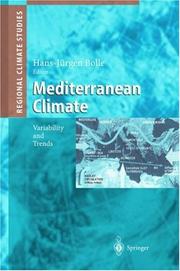
ISBN: 3540438386 3642628621 3642556574 9783540438380 Year: 2003 Publisher: Berlin: Springer,
Abstract | Keywords | Export | Availability | Bookmark
 Loading...
Loading...Choose an application
- Reference Manager
- EndNote
- RefWorks (Direct export to RefWorks)
Mohamed Larbi Selassi Deputy Director of the National Meteorology, Morocco Welcome address (translated from French) WMO, WCRP, Medias-France and scientific institutions representatives, ladies and gentlemen, to thank WMO and MEDIAS-France, who have honoured us by I want first organizing the two workshops, climate indices in Africa and data assessment for global change research in the Mediterranean region, in Casablanca and I welcome all of you here in Morocco. It is with great pleasure that I open these two workshops on behalf of myself and on behalf of the Direction of the Meteorologie N ationale of Morocco. Climate change is becoming the focus of the international community because of its global scale and unpredictable effects, the numerous impacts it causes, its global feature and the complexity of the solutions that can mitigate its impacts. Global warming and the greenhouse effect became a subject of study at the international level since the United Nations Conference on the human environment that was held in Stockholm in 1972. The research and coordination efforts that have been made in this area have led to an "International Scientific consensus". High level meetings like those held in Toronto in 1988, in Lahaye in 1989 and in Geneva in 1990, did confirm the greenhouse threat and the emergency to treat it.
Climatic changes --- Mediterranean Region --- Climate. --- Earth sciences. --- Atmospheric sciences. --- Geotechnical engineering. --- Geography. --- Space sciences. --- Air pollution. --- Earth Sciences. --- Atmospheric Sciences. --- Atmospheric Protection/Air Quality Control/Air Pollution. --- Extraterrestrial Physics, Space Sciences. --- Geotechnical Engineering & Applied Earth Sciences. --- Geography, general. --- Space Sciences (including Extraterrestrial Physics, Space Exploration and Astronautics). --- Cosmography --- Earth sciences --- World history --- Engineering, Geotechnical --- Geotechnics --- Geotechnology --- Engineering geology --- Science and space --- Space research --- Cosmology --- Science --- Astronomy --- Air --- Air contaminants --- Air pollutants --- Air pollution --- Air pollution control --- Air toxics --- Airborne pollutants --- Atmosphere --- Contaminants, Air --- Control of air pollution --- Pollutants, Air --- Toxics, Air --- Pollution --- Air quality --- Atmospheric deposition --- Atmospheric sciences --- Control --- Climatic changes - Mediterranean Region. --- Mediterranean Region - Climate.
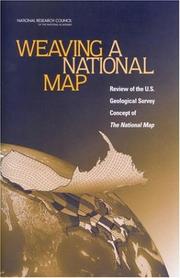
ISBN: 0309087473 0309513782 9780309513784 9780309087476 0309168554 Year: 2003 Publisher: Washington, D.C. : National Academies Press,
Abstract | Keywords | Export | Availability | Bookmark
 Loading...
Loading...Choose an application
- Reference Manager
- EndNote
- RefWorks (Direct export to RefWorks)
Cartography -- United States. --- Electronic books. -- local. --- Geological Survey (U.S.). --- Cartography --- Geography-General --- Geography --- Earth & Environmental Sciences --- Geological Survey (U.S.) --- Cartography, Primitive --- Chartography --- Map-making --- Mapmaking --- Mapping (Cartography) --- U.S.G.S. --- U.S. Geological Survey --- United States. --- Servicio Geológico de los Estados Unidos --- United States Geological Survey --- USGS --- Mathematical geography --- Surveying --- Map projection --- Maps --- Geographical and Geological Survey of the Rocky Mountain Region (U.S.) --- Geographical Surveys West of the 100th Meridian (U.S.) --- Geological and Geographical Survey of the Territories (U.S.)
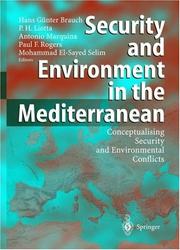
ISBN: 3540401075 3642624790 3642558542 Year: 2003 Publisher: Berlin : Springer,
Abstract | Keywords | Export | Availability | Bookmark
 Loading...
Loading...Choose an application
- Reference Manager
- EndNote
- RefWorks (Direct export to RefWorks)
In this volume security specialists, peace researchers, environmental scholars, demographers as well as climate, desertification, water, food and urbanisation specialists from the Middle East and North Africa, Europe and North America review security and conflict prevention in the Mediterranean. They also analyse NATO’s Mediterranean security dialogue and offer conceptualisations on security and perceptions of security challenges as seen in North and South. The latter half of the book analyses environmental security and conflicts in the Mediterranean and environmental consequences of World War II, the Gulf War, the Balkan wars and the Middle East conflict. It also examines factors of global environmental change: population growth, climate change, desertification, water scarcity, food and urbanisation issues as well as natural disasters. Furthermore, it draws conceptual conclusions for a fourth phase of research on human and environmental security and peace as well as policy conclusions for cooperation and partnership in the Mediterranean in the 21st century.
National security --- Geography. --- Environmental economics. --- Regional economics. --- Spatial economics. --- Political science. --- European Economic Community literature. --- Environmental law. --- Environmental policy. --- Geography, general. --- Environmental Economics. --- Regional/Spatial Science. --- Political Science. --- European Integration. --- Environmental Law/Policy/Ecojustice. --- Environment and state --- Environmental control --- Environmental management --- Environmental protection --- Environmental quality --- State and environment --- Environmental auditing --- Environment law --- Environmental policy --- Law --- Sustainable development --- Administration --- Civil government --- Commonwealth, The --- Government --- Political theory --- Political thought --- Politics --- Science, Political --- Social sciences --- State, The --- Spatial economics --- Economics --- Regional economics --- Regional planning --- Regionalism --- Space in economics --- Cosmography --- Earth sciences --- World history --- Government policy --- Law and legislation --- Environmental aspects --- Economic aspects
Book
ISBN: 1280009810 9786610009817 038722615X Year: 2003 Publisher: New York : Springer,
Abstract | Keywords | Export | Availability | Bookmark
 Loading...
Loading...Choose an application
- Reference Manager
- EndNote
- RefWorks (Direct export to RefWorks)
Nowhere on Earth is the challenge for ecological understanding greater, and yet more urgent, than in those parts of the globe where human activity is most intense - cities. People need to understand how cities work as ecological systems so they can take control of the vital links between human actions and environmental quality, and work for an ecologically and economically sustainable future. An ecosystem approach integrates biological, physical and social factors and embraces historical and geographical dimensions, providing our best hope for coping with the complexity of cities. This book is a first of its kind effort to bring together leaders in the biological, physical and social dimensions of urban ecosystem research with leading education researchers, administrators and practitioners, to show how an understanding of urban ecosystems is vital for urban dwellers to grasp the fundamentals of ecological and environmental science, and to understand their own environment.
Urban ecology (Sociology) --- Ecosystem management --- Biotic communities --- Study and teaching --- Regional planning. --- Applied Ecology. --- Geography. --- Social policy. --- Landscape/Regional and Urban Planning. --- Geography, general. --- Social Policy. --- Urban planning. --- Applied ecology. --- National planning --- State planning --- Economic policy --- Family policy --- Social history --- Cosmography --- Earth sciences --- World history --- Ecology --- Environmental protection --- Nature conservation --- Cities and towns --- City planning --- Civic planning --- Land use, Urban --- Model cities --- Redevelopment, Urban --- Slum clearance --- Town planning --- Urban design --- Urban development --- Urban planning --- Land use --- Planning --- Art, Municipal --- Civic improvement --- Regional planning --- Urban policy --- Urban renewal --- Regional development --- Human settlements --- Landscape protection --- Government policy --- Management --- Ecosystem management.
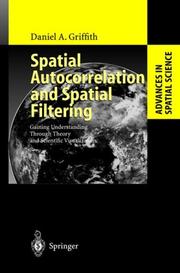
ISBN: 3540009329 3642056660 3540248064 9783540009320 Year: 2003 Publisher: Berlin: Springer,
Abstract | Keywords | Export | Availability | Bookmark
 Loading...
Loading...Choose an application
- Reference Manager
- EndNote
- RefWorks (Direct export to RefWorks)
Advances in Spatial Science This series of books is dedicated to reporting on recent advances in spatial science. It contains scientific studies focusing on spatial phenomena, utilising theoretical frameworks, analytical methods, and empirical procedures specifically designed for spatial analysis. The series brings together innovative spatial research utilising concepts, perspectives, and methods with a relevance to both basic science and policy making. The aim is to present advances in spatial science to an informed readership in universities, research organisations, and policy-making institutions throughout the world. The type of material considered for publication in the series includes: - Monographs of theoretical and applied research in spatial science; - State-of-the-art volumes in areas of basic research; - Reports of innovative theories and methods in spatial science; - Tightly edited reports form specially organised research seminars. Manuscripts must be prepared in accordance with the guidelines for authors and editors that may be obtained from Springer-Verlag. Manuscripts considered for the series will be reviewed by independent experts to ensure their originality, scientific level, and international policy relevance.
Spatial analysis (Statistics) --- Digital filters (Mathematics) --- Geography --- Statistical methods --- Environmental Sciences and Forestry. Remote Sensing and Geographical Information Systems --- Statistical methods. --- Remote Sensing --- Digital filters (Mathematics). --- Spatial analysis (Statistics). --- Remote Sensing. --- Geography. --- Probabilities. --- Geographical information systems. --- Statistics . --- Environmental monitoring. --- Econometrics. --- Geography, general. --- Probability Theory and Stochastic Processes. --- Geographical Information Systems/Cartography. --- Statistics for Business, Management, Economics, Finance, Insurance. --- Monitoring/Environmental Analysis. --- Economics, Mathematical --- Statistics --- Biomonitoring (Ecology) --- Ecological monitoring --- Environmental quality --- Monitoring, Environmental --- Applied ecology --- Environmental engineering --- Pollution --- Statistical analysis --- Statistical data --- Statistical science --- Mathematics --- Econometrics --- Geographical information systems --- GIS (Information systems) --- Information storage and retrieval systems --- Probability --- Statistical inference --- Combinations --- Chance --- Least squares --- Mathematical statistics --- Risk --- Cosmography --- Earth sciences --- World history --- Measurement --- Monitoring --- Geography - Statistical methods
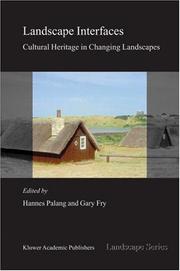
ISBN: 1402014376 904816348X 940170189X Year: 2003 Publisher: Dordrecht : Kluwer Academic Publishers,
Abstract | Keywords | Export | Availability | Bookmark
 Loading...
Loading...Choose an application
- Reference Manager
- EndNote
- RefWorks (Direct export to RefWorks)
The book contributes to the relatively extensive study of landscapes by exploring the interfaces in the landscape. Instead of taking a viewpoint of some of the disciplines we try to map the links between them, indicate points for common understanding and cooperation. These interfaces happen between different cultures, between natural and human sciences, past and present, lay people and experts, time and space, preservation and use, ecology and semiosis. It compares how different cultures interpret landscapes, how cultural values are assessed, explores new tools for assessment, picks up the discussion about landscape authenticity, and finally draws perspectives for further research. It is not a textbook on its own, rather it is additional reading for any course dealing with landscapes on advanced levels, for geographers, landscape ecologists, landscape architects and everybody concerned with landscapes.
Landscape changes --- Landscape assessment --- Landscape ecology --- Geografie --- Landschapskunde --- Algemeen. --- Geography. --- Agriculture. --- Cultural heritage. --- Regional planning. --- Urban planning. --- Environmental management. --- Geography, general. --- Cultural Heritage. --- Landscape/Regional and Urban Planning. --- Environmental Management. --- Environmental stewardship --- Stewardship, Environmental --- Environmental sciences --- Management --- Cities and towns --- City planning --- Civic planning --- Land use, Urban --- Model cities --- Redevelopment, Urban --- Slum clearance --- Town planning --- Urban design --- Urban development --- Urban planning --- Land use --- Planning --- Art, Municipal --- Civic improvement --- Regional planning --- Urban policy --- Urban renewal --- Regional development --- State planning --- Human settlements --- Landscape protection --- Cultural heritage --- Cultural patrimony --- Cultural resources --- Heritage property --- National heritage --- National patrimony --- National treasure --- Patrimony, Cultural --- Treasure, National --- Property --- World Heritage areas --- Farming --- Husbandry --- Industrial arts --- Life sciences --- Food supply --- Land use, Rural --- Cosmography --- Earth sciences --- World history --- Government policy

ISBN: 3540003665 3642055710 3662071363 9783540003663 Year: 2003 Publisher: Berlin: Springer,
Abstract | Keywords | Export | Availability | Bookmark
 Loading...
Loading...Choose an application
- Reference Manager
- EndNote
- RefWorks (Direct export to RefWorks)
Advances in Spatial Science This series of books is dedicated to reporting on recent advances in spatial science. It contains scientific studies focusing on spatial phenomena, utilising theoretical frameworks, analytical methods, and empirical procedures specifically designed for spatial analysis. The series brings together innovative spatial research utilising concepts, perspectives, and methods with a relevance to both basic science and policy making. The aim is to present advances in spatial science to an informed readership in universities, research organisations, and policy-making institutions throughout the world. The type of material considered for publication in the series includes: - Monographs of theoretical and applied research in spatial science; - State-of-the-art vorlumes in areas of basic research; - Reports of innovative theories and methods in spatial science; - Tightly edited reports form specially organised research seminars. Manuscripts must be prepared in accordance with the guidelines for authors and editors that may be obtained from Springer-Verlag. Manuscripts considered for the series will be reviewed by independent experts to ensure their originality, scientific level, and international policy relevance.
Europe --- Economic conditions --- Econometric models --- Regional disparities --- EEC / European Union - EU -Europese Unie - Union Européenne - UE --- 338.8 --- 338.43 --- 338.32 --- Economische groei. --- Regionaal beleid. Industriële ontwikkeling en omschakeling van bepaalde regio's. Nieuwe industrieën. --- Vestigingsplaats en specialisatie van de productie. Ondernemingscentra. --- Vestigingsplaats en specialisatie van de productie. Ondernemingscentra --- Regionaal beleid. Industriële ontwikkeling en omschakeling van bepaalde regio's. Nieuwe industrieën --- Economische groei --- Council of Europe countries --- Econometric models. --- Regional disparities. --- Eastern Hemisphere --- Eurasia --- Economic policy. --- Regional economics. --- Spatial economics. --- Geography. --- Regional planning. --- Urban planning. --- Econometrics. --- Economic Policy. --- Regional/Spatial Science. --- Geography, general. --- Landscape/Regional and Urban Planning. --- Economics, Mathematical --- Statistics --- Cities and towns --- City planning --- Civic planning --- Land use, Urban --- Model cities --- Redevelopment, Urban --- Slum clearance --- Town planning --- Urban design --- Urban development --- Urban planning --- Land use --- Planning --- Art, Municipal --- Civic improvement --- Regional planning --- Urban policy --- Urban renewal --- Regional development --- State planning --- Human settlements --- Landscape protection --- Cosmography --- Earth sciences --- World history --- Spatial economics --- Economics --- Regional economics --- Regionalism --- Space in economics --- Economic nationalism --- Economic planning --- National planning --- National security --- Social policy --- Government policy --- Management --- Europe - Economic conditions - 1945 --- -Europe - Economic conditions - Econometric models --- Europe - Economic conditions - Regional disparities
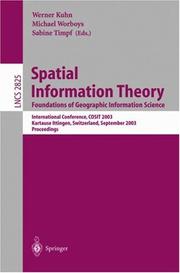
ISBN: 3540399232 3540201483 Year: 2003 Publisher: Berlin, Heidelberg : Springer Berlin Heidelberg : Imprint: Springer,
Abstract | Keywords | Export | Availability | Bookmark
 Loading...
Loading...Choose an application
- Reference Manager
- EndNote
- RefWorks (Direct export to RefWorks)
COSIT,theseriesofConferencesonSpatialInformationTheory,hasbeenaround for more than ten years. Its hallmarks are a fruitful interdisciplinary dialogue between computational and human perspectives on spatio-temporal information and a thorough review process that selects the best papers while giving all - thors detailed feedback on how to develop their work. A clear pro?le of the COSIT community has emerged from the series of conference proceedings, all published as Springer Lecture Notes in Computer Science, and from the per- nent web site at http://www. cosit. info, containing links to the conference web sites and proceedings, a history and program of the series, an impact study, interviews with participants, and pictures. The proceedings of this sixth conference provide ample evidence that COSIT is healthy and maturing, while retaining its youth. Out of the 61 submissions, the program committee selected 26 papers for presentation, in discussions based on at least three double-blind reviews and one or more meta-review from PC members for each paper. Classical COSIT themes, such as spatial reasoning (about distances and directions, regions and shapes) or vagueness are being f- ther re?ned; topics like way?nding and landmarks are boosted by new synergies betweencognitiveandcomputationalapproaches;andthestudyofontologiesfor space and time, a subject since the ?rst COSIT, is gaining more depth.
Geographic information systems --- Geography-General --- Computer Science --- Engineering & Applied Sciences --- Geography --- Earth & Environmental Sciences --- Geography. --- Earth sciences. --- Data structures (Computer science). --- Computers. --- Database management. --- Artificial intelligence. --- Geographical information systems. --- Geographical Information Systems/Cartography. --- Data Structures. --- Earth Sciences, general. --- Computation by Abstract Devices. --- Database Management. --- Artificial Intelligence (incl. Robotics). --- Data structures (Computer scienc. --- Computer science. --- Artificial Intelligence. --- AI (Artificial intelligence) --- Artificial thinking --- Electronic brains --- Intellectronics --- Intelligence, Artificial --- Intelligent machines --- Machine intelligence --- Thinking, Artificial --- Bionics --- Cognitive science --- Digital computer simulation --- Electronic data processing --- Logic machines --- Machine theory --- Self-organizing systems --- Simulation methods --- Fifth generation computers --- Neural computers --- Data base management --- Data services (Database management) --- Database management services --- DBMS (Computer science) --- Generalized data management systems --- Services, Database management --- Systems, Database management --- Systems, Generalized database management --- Informatics --- Science --- Cosmography --- Earth sciences --- World history --- Geographical information systems --- GIS (Information systems) --- Information storage and retrieval systems --- Automatic computers --- Automatic data processors --- Computer hardware --- Computing machines (Computers) --- Electronic calculating-machines --- Electronic computers --- Hardware, Computer --- Computer systems --- Cybernetics --- Calculators --- Cyberspace --- Geosciences --- Environmental sciences --- Physical sciences --- Information structures (Computer science) --- Structures, Data (Computer science) --- Structures, Information (Computer science) --- File organization (Computer science) --- Abstract data types (Computer science) --- Geographic information systems. --- Data structures (Computer science)
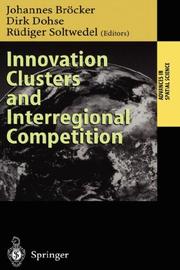
ISBN: 354000999X 3642056776 3540247602 Year: 2003 Publisher: Berlin Springer
Abstract | Keywords | Export | Availability | Bookmark
 Loading...
Loading...Choose an application
- Reference Manager
- EndNote
- RefWorks (Direct export to RefWorks)
Advances in Spatial Science This series of books is dedicated to reporting on recent advances in spatial science. It contains scientific studies focusing on spatial phenomena, utilising theoretical frameworks, analytical methods, and empirical procedures specifically designed for spatial analysis. The series brings together innovative spatial research utilising concepts, perspectives, and methods with a relevance to both basic science and policy making. The aim is to present advances in spatial science to an informed readership in universities, research organisations, and policy-making institutions throughout the world. The type of material considered for publication in the series includes: - Monographs of theoretical and applied research in spatial science; - State-of-the-art volumes in areas of basic research; - Reports of innovative theories and methods in spatial science; - Tightly edited reports form specially organised research seminars. Manuscripts must be prepared in accordance with the guidelines for authors and editors that may be obtained from Springer-Verlag. Manuscripts considered for the series will be reviewed by independent experts to ensure their originality, scientific level, and international policy relevance.
332 --- 911.3:33 --- Regional economics --- Technological innovations --- -Economic geography --- Space in economics --- AA / International- internationaal --- 380.22 --- 338.043 --- 338.6 --- Spatial economics --- Economics --- Geography, Economic --- World economics --- Geography --- Commercial geography --- Breakthroughs, Technological --- Innovations, Industrial --- Innovations, Technological --- Technical innovations --- Technological breakthroughs --- Technological change --- Creative ability in technology --- Inventions --- Domestication of technology --- Innovation relay centers --- Research, Industrial --- Technology transfer --- Regional planning --- Regionalism --- Regionale economie. Territoriale economie. Grond en bodem. Onroerend goed. Economie van het wonen --- Economische geografie --- Economic aspects --- Concurrentie. Monopolie, duopolie, oligopolie. --- Technologische vooruitgang. Automatisering. Computers. Werkgelegenheid en informatica. --- Wetenschappelijk onderzoek en ontwikkeling. --- Economic geography --- Social Sciences and Humanities. Economics --- Regional Economics --- Regional Economics. --- 332 Regionale economie. Territoriale economie. Grond en bodem. Onroerend goed. Economie van het wonen --- Technologische vooruitgang. Automatisering. Computers. Werkgelegenheid en informatica --- Wetenschappelijk onderzoek en ontwikkeling --- Concurrentie. Monopolie, duopolie, oligopolie --- Economics. --- Management science. --- Regional economics. --- Spatial economics. --- Geography. --- Economic policy. --- Business. --- Political science. --- Economics, general. --- Regional/Spatial Science. --- Geography, general. --- R & D/Technology Policy. --- Business and Management, general. --- Political Science. --- Administration --- Civil government --- Commonwealth, The --- Government --- Political theory --- Political thought --- Politics --- Science, Political --- Social sciences --- State, The --- Trade --- Management --- Commerce --- Industrial management --- Economic nationalism --- Economic planning --- National planning --- State planning --- Planning --- National security --- Social policy --- Cosmography --- Earth sciences --- World history --- Quantitative business analysis --- Problem solving --- Operations research --- Statistical decision --- Economic theory --- Political economy --- Economic man
| Listing 1 - 9 of 9 |
Sort by
|

 Search
Search Feedback
Feedback About UniCat
About UniCat  Help
Help News
News